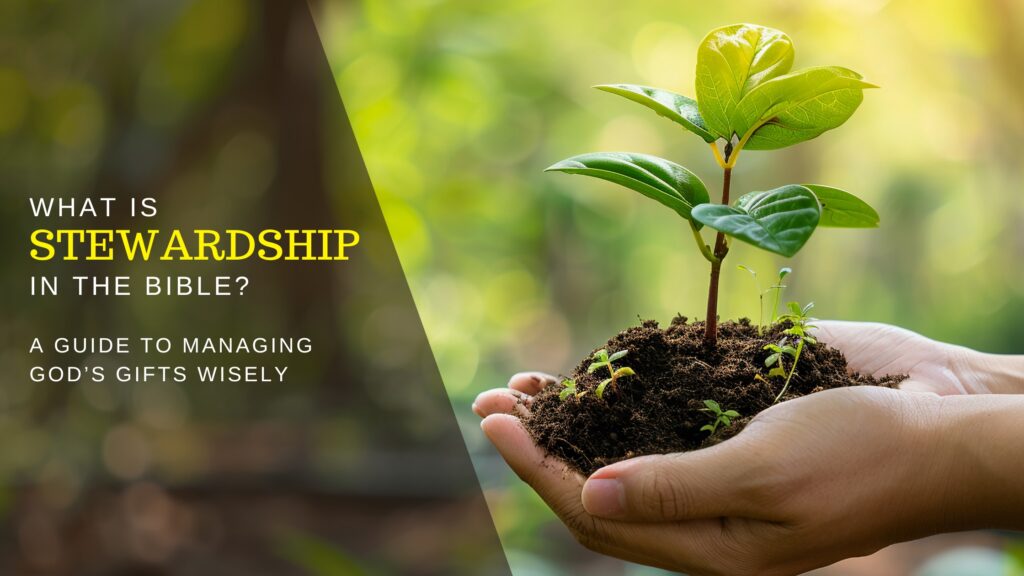What Is Stewardship in the Bible?
A Stewards Guide to Managing God’s Gifts Wisely

When you think of stewardship in the Bible, do you think of offering envelopes and church budgets?
Biblical stewardship goes far deeper than paying a tithe. It’s about how we manage everything God has entrusted to us, from our money to our time, talents, relationships and even the environment around us.
If you’ve ever wondered what is stewardship in the Bible beyond tithing or church giving, the answer is far broader and far more beautiful. Read on, Good Steward!
Table of contents
- A Stewards Guide to Managing God’s Gifts Wisely
- What Is Stewardship in the Bible? Remembering God’s Original Gift
- Jesus Christ: The Ultimate Steward and Teacher
- The Prodigal Son: A Story of Waste and Restoration
- Receive God’s Gifts: A Good Steward to All the Earth
- God’s Love in Action: How Stewardship Transforms the Heart
- How Good Stewardship Serves the Steward
- Common Misunderstandings About Stewardship
- Understanding What Stewardship in the Bible Looks Like Today
- Teaching Children Stewardship in the Bible- FREE RESOURCE
- Let the 2025 Jubilee Year Reset and Renew Life as a Good Steward
- Conclusion: Stewardship as a Grateful Response
Stewardship as Defined by Merriam-Webster
According to Merriam-Webster, stewardship is “the conducting, supervising, or managing of something; especially: the careful and responsible management of something entrusted to one’s care.”
That definition is a great starting point—but believers are called on to look deeper. And stewardship runs much deeper. It reflects how we respond to God’s gifts—from our finances and time to our talents and influence—with gratitude, responsibility, and purpose.
So, what is stewardship in the Bible?
It’s more than managing money—biblical stewardship is a way of living that reflects God’s ownership of everything and our responsibility to manage it faithfully.
Let’s explore biblical stewardship and its importance in the life of a Christian, no matter where they are on their financial journey.
What Is Stewardship in the Bible? Remembering God’s Original Gift
Biblical stewardship begins in the very first pages of Scripture, with Adam and Eve in the Garden of Eden. God created the heavens and the Earth and entrusted creation to humankind.
“God blessed them and said to them, ‘Be fruitful and increase in number; fill the Earth and subdue it. Rule over the fish in the sea and the birds in the sky and over every living creature that moves on the ground.’”
— Genesis 1:28, NIV
This moment laid the foundation for stewardship throughout the Bible: God owns everything, and we are caretakers—managers of His resources.
A good steward, therefore, isn’t someone who hoards or misuses what they’ve been given. Instead, they recognize that everything—from money and time to the creatures and environment around us—belongs to God, and they’re called to manage it faithfully.
“Now it is required that those who have been given a trust must prove faithful.”
— 1 Corinthians 4:2, NIV
Jesus Christ: The Ultimate Steward and Teacher
When we look to the life of Jesus Christ, we see the perfect model of stewardship. He stewarded His time, relationships, environment and mission with perfect intention.
Jesus taught parables that reflected the heart of stewardship, including the Parable of the Talents in Matthew 25, where servants are entrusted with money and rewarded (or judged) based on how they used it.
The message?
God expects His people to invest His gifts wisely—not bury them out of fear or laziness.
The Prodigal Son: A Story of Waste and Restoration
There are many examples of stewardship in the Bible.
One of Jesus’ most well-known parables, found in Luke 15:11–32, tells the story of a young man who demands his inheritance early, then squanders it all on reckless living. When a famine hits, he finds himself destitute—longing to eat what the pigs eat.
Eventually, he “comes to his senses,” returns home in humility, and prepares to beg his father for a place as a servant. But his father sees him from afar, runs to him, embraces him, and restores him—not as a servant, but as a beloved son.
This is more than a story about financial recklessness—it’s a parable about stewardship, repentance, and grace. The son mismanages the resources entrusted to him. Yet when he returns, the father responds with compassion and celebration. His return reflects the transformation that happens when we acknowledge our failures and choose to steward what remains with renewed purpose.
Like the prodigal, we may not always steward God’s gifts wisely. But the story reminds us: your past doesn’t disqualify you from God’s purpose. Faithful stewardship can begin again today—with humility, wisdom, and grace.
Receive God’s Gifts: A Good Steward to All the Earth
The Bible teaches that stewardship isn’t just about giving. It’s about recognizing the gift that we’ve inherited. We are all recipients of God’s gifts—and they go far beyond just our paychecks. Stewardship responsibilities are present in every part of our lives:
1. Stewardship of Money
One of the most tangible areas is money. Christians are called to manage finances wisely—not just for personal gain but for Kingdom purposes.
Good stewardship of money includes:
- Creating a budget that honors God (see: How to Create a God-Honoring Budget)
- Paying down debt intentionally (see: Christian Debt Management Tips)
- Tithing and giving generously (see: Tithing While in Debt)
- Saving without becoming greedy (see: Debt Relief Options)
- Investing in ways that align with biblical values (see: Responsible Investments for the Christian Minded)
2. Stewardship of Time
Time is one of our most limited resources. How we spend it speaks volumes about what we value. Do we make space for prayer, service, and rest? How can we simplify our financial life? Are we intentional with our calendars, or constantly busy without eternal fruit?
3. Stewardship of Talents
Each Christian is uniquely gifted. Whether you lead, teach, encourage, or serve, you’ve been entrusted with spiritual gifts for the benefit of others.
“Each of you should use whatever gift you have received to serve others, as faithful stewards of God’s grace in its various forms.”
— 1 Peter 4:10, NIV
4. Stewardship of the Earth
From the beginning, God called us not just to rule the Earth—but to tend and watch over it, like shepherds entrusted with a precious flock.
“The Lord God took the man and put him in the Garden of Eden to work it and take care of it.”
— Genesis 2:15, NIV
God sent Adam and Eve to the Garden of Eden to work and take care of it. Our first example of stewardship in the Bible is the responsibility modeled in the Garden of Eden, when Adam and Eve were placed in creation to nurture and protect it. Our environment and Earth’s resources are among the first gifts we received.
God’s Love in Action: How Stewardship Transforms the Heart
Biblical stewardship isn’t just about doing—it’s about becoming. As the Holy Spirit grows within us, we grow in spiritual maturity by learning to trust God with everything. Choosing to act as a good steward trains our hearts to release control, embrace generosity, and live with eternal perspective.
Gratitude for God’s work and the gifts received shifts the way we make decisions. Instead of asking, “What do I want to do with my money or time?” we ask, “God, let me be a faithful servant, reveal what You would have me do with what You’ve given me.”
A heart of gratitude transforms everything.
How Good Stewardship Serves the Steward
Faithful stewardship brings the light of God’s love into your life. Not just financially, but emotionally and spiritually. Here’s how:
- Less Financial Stress: Budgeting and debt management rooted in biblical wisdom bring freedom and peace.
- Deeper Contentment: When we steward what we already have, we stop striving for more.
- Stronger Relationships: Stewarding time well creates margin for family, rest, and community.
- Greater Purpose: God reveals our purpose, uplifting us toward fulfillment and Kingdom impact.
Common Misunderstandings About Stewardship
Many misconceptions come from not understanding what stewardship in the Bible calls for versus cultural assumptions about money or giving. Let’s shed light on these common misunderstandings:
Stewardship Isn’t Just About Giving
It includes giving—but also managing, saving, spending, and even enjoying God’s gifts responsibly.
It’s Not a One-Time Act
Stewardship is a lifestyle, not a seasonal church campaign.
It’s Not the Prosperity Gospel
Stewardship doesn’t promise wealth. It’s about faithfulness, not financial outcomes.
Understanding What Stewardship in the Bible Looks Like Today
To live out what stewardship in the Bible looks like today, Christians must apply ancient spiritual principles to modern realities. Stewardship isn’t just something we read about in Scripture but a daily lived posture of gratitude, discipline, generosity, and trust.
When we understand what stewardship in the Bible asks of us, everyday decisions about time, money, relationships, and purpose gain new clarity.
Living Stewardship Daily: Practical Next Steps for Christian Disciples
How can you start living out stewardship in your daily life?
Create a Faith-Based Budget
A budget helps you be intentional with your resources. (Consider this Faith-Based Budgeting Approach)
Review Your Time Commitments
Audit your calendar. Are you making space for God, family, service, and rest?
Discover Your Spiritual Gifts
Take a spiritual gifts assessment and ask how you can use your gifts in your church or community.
Commit to Generosity
Start giving regularly—tithing even if you’re in debt—and watch how it shapes your heart.
Teach Good Stewardship at Home
Include your spouse and kids in conversations about giving, saving, and spending.
Teaching Children Stewardship in the Bible- FREE RESOURCE
Want to bring this conversation home to your family? Learn and practice stewardship together. Our free guide, Wise vs. Wasteful: The Prodigal Son, is a great way to open your teen to biblical discussions about money, mistakes, and God’s grace.
✅ Intended for families, youth groups, and small groups
✅ Includes a devotional, prayer, discussion prompts, and a “needs vs. wants” challenge
✅ Biblically grounded and easy to use
👉 Download or print the free resource for teens and start making faith and finance a family conversation.
Let the 2025 Jubilee Year Reset and Renew Life as a Good Steward
In Scripture, the Year of Jubilee was a sacred time when debts were forgiven, land was restored, and lives were reset. It was a divine invitation to rest, release, and realign with God’s purposes. As we walk through 2025—designated as a Year of Jubilee—you may be sensing it’s time for a reset in your own financial life.
If you’ve been struggling under the weight of debt, know this: you’re not alone. Many Christian disciples—even Adam and Eve—have faced moments where their stewardship fell out of alignment. God always makes a way back. He offers grace and forgiveness, so we should trust God even in financial uncertainty.
Countless examples and FaithWorks Financial reviews give testimony to what’s possible when you bring Christ into your finances. After a Christian debt counseling session, a client shared, “I had no idea where to turn, but FaithWorks listened without judgment and gave me a clear path forward.” Another said, “It felt like a burden was lifted off my shoulders—I finally had hope again.”
This Jubilee year, let God’s grace be your fresh start. Whether you consider one of our Christian debt relief programs or adjust your scales on your own, let this be your season of release.
👉 Schedule your free Christian debt relief consultation today and take the first step toward debt relief.
👉 Enjoy our free eBook: “Jubilee 2025: Stepping into your Season of Grace” to learn how biblical principles can transform your financial story.
The time is now. God is ready to intervene in your finances—are you ready to receive His grace?
Conclusion: Stewardship as a Grateful Response
So, what does biblical stewardship actually look like?
It’s the grateful response of a heart transformed by grace—a recognition that everything we have is from God, and we are called to manage it with wisdom, care, and purpose.
Like the prodigal son, we may fall short in how we steward what God entrusts to us—but His grace meets us there. Stewardship begins not with perfection, but with a willing heart.



